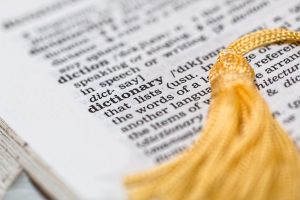Appendix Four: Glossary
Andy Gurevich
Terms and Definitions

Annotate: To add notes or symbolic marks to a text, diagram, or other content.
Auto-didacticism: (also autodidactism) or self-education (also self-learning and self-teaching) is education without the guidance of masters (such as teachers and professors) or institutions (such as schools). For our purposes, it is learning how to “think about our own thinking” and hold our own thinking to account through the application of reason and proper engagement with relevant, reliable, authoritative sources.
Copyright: A right granted by statute to the author or originator of certain literary or artistic productions, whereby he is invested, for a limited period, with the sole and exclusive privilege of multiplying copies of the same and publishing and selling them (“What Is Copyright?”).
Curriculum vitae (CV): A lifelong account of a person’s education, awards and honors, conferences and presentations, publications, professional memberships, employment, and so forth. A CV may be dozens of pages long; it doesn’t attempt to be brief—as would a résumé; rather, it is an encyclopedic collect of a person’s accomplishments.
Empiric disciplines: the fields of study concerned with subjects that can be measured or subjected to quantification or testing. For example: history, science, math, and psychology.
Essay: an analytic, interpretative, or critical literary composition usually much shorter and less systematic and formal than a dissertation and usually dealing with its subject from a limited and often personal point of view. The term comes from the French “essai”: “to attempt,” meaning an essay is an attempt on the part of the writer to gain greater understanding and insight on a topic through engaging in the process of thinking deeply, researching, and writing about it.
Figurative language: writing or speaking that uses metaphor, simile, irony, sarcasm, personification, or other techniques to create a specific response.
Freelance writer: a professional writer who is hired and assigned to write specific stories or articles. Freelancers may not be experts in subjects they’re assigned to write about, but they are skilled researchers, enabling them to write about varied topics.
Humanities: the fields of study concerned with human culture, especially literature, history, art, music, and philosophy.
Inform: (e.g., The story was informed by his experience in Nepal): an essential idea or principle that supports the development of another idea, e.g., understanding U.S. history informs our understanding of current events.
Information literacy: refers to skill and competence in locating, examining, understanding, and working with all kinds of information.
Intellectual property: material or ideas envisioned and/or created by another person.
Jargon: special words, abbreviations, or expressions that are used by a particular profession or group and are often difficult for others to understand.
Journalist: a skilled writer who has completed a college bachelor’s degree in journalism. Journalistic writing follows a specific style that is fact-based and objective. Journalists subscribe to codes of ethics and behavior in terms of creating factual, verified, and unbiased writing.
Multimodal: Multimodality is the application of multiple literacies within one medium. Multiple literacies or “modes” contribute to an audience’s understanding of a composition. Everything from the placement of images to the organization of the content to the method of delivery creates meaning. Multimodal instruction and composition uses writing, images, video, audio, and other communicative modalities to explore, develop, and communicate relevant information to a recipient.
Navigate: to find one’s way, whether over open seas or through a challenging piece of writing.
Open Educational Resources (OERs): documents, media, and other materials that are useful for teaching and learning and which are free and available to all.
Periodical: a publication that is printed on a regular schedule (i.e., periodically). Periodicals include newspapers, magazines, journals, and more. Periodical titles should always be italicized in your academic writing.
Résumé: a brief (1-2 page) account of a person’s education, work experience, and qualifications, typically sent with a job application. A longer version of the résumé is the curriculum vitae, often called the CV.
Rhetoric: the art of effective or persuasive speaking or writing, especially in the use of figurative language or special techniques in argument and composition.
Zine: short for magazine, a zine is a self-published collection of writing, drawing, poetry, art, or just about any type of creative material that can be part of a printed page. Zines are informal publications and are usually published or created in small lots. They’re often low-tech, not looking anything like what we imagine as an actual magazine. Their purpose is to allow one or more contributors to express their creative ideas about a specific theme or idea. To learn more, go to Google and search for “zine.”
(adapted, in part, from The Word on College Reading and Writing by Carol Burnell, Jaime Wood, Monique Babin, Susan Pesznecker, and Nicole Rosevear. This OER text is licensed under a Creative Commons Attribution-NonCommercial 4.0 International License, except where otherwise noted.)

